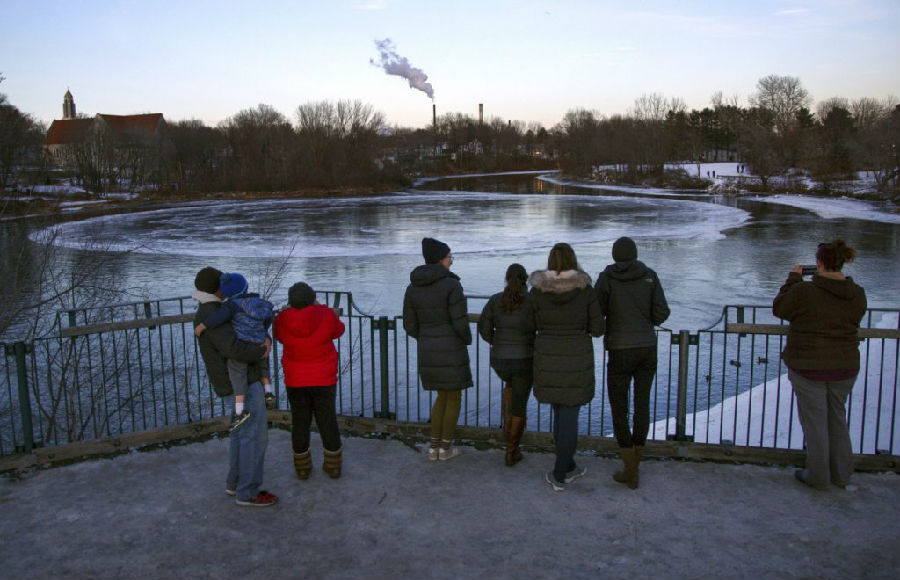And, finally, a very different story about ice. A small community outside Portland, Maine, got a lot of attention this week for a particularly frosty and rare natural phenomenon. The NewsHour's Julia Griffin, with the help of Maine Public Television, explains.
JULIA GRIFFIN: The icy oddity in Westbrook, Maine, this week made bystanders stop to take a second look. It wasn't the moon, or an alien spacecraft, but a huge circular disc of ice spinning ever-so-slightly in the Presumpscot River. Residents saw the disc form slowly over the course of a few days.
CATHI SAWTELLE, Local Resident: About a week or so ago, I noticed this small round piece of ice. And it would be swirling counterclockwise, just slowly.
JULIA GRIFFIN: Since then, the disc ballooned to more than 300 feet across, rotating like a giant Lazy Susan.
LYNDA ADAMS, Westbrook City Councillor: I think the ducks and the seagulls are enjoying the natural amusement ride going on in the middle of the river. It's been great.
JULIA GRIFFIN: It isn't the first time spinning ice circles have been spotted in the river, but it is the biggest anyone in Westbrook can recall.

TED SCAMBOS, University of Colorado at Boulder: It's a spectacular version of this. I don't think I have heard of any of them that are as large as the one near Westbrook.
JULIA GRIFFIN: Ted Scambos is a senior research scientist at the University of Colorado at Boulder. He said ice discs are rare because they require the right combination of temperature, river shape and water speed.
TED SCAMBOS: What you need is an area that has freezing conditions, but just barely freezing conditions, and a river with the right kind of bend in it, so that you get a large eddy that's almost circular.
JULIA GRIFFIN: And in those conditions, small pieces of ice can begin to solidify into a solid plate.
TED SCAMBOS: And once they do, they're going to get, sort of, shaved a little bit as they go around the riverbank each time, and that's what makes that perfect circle.
JULIA GRIFFIN: But, just like ice itself, the disc's movement froze Wednesday, a development that didn't surprise scientists like Scambos.
TED SCAMBOS: These things are very ephemeral, and it's great that people are appreciating it while it's happening, because it won't last long. They either break up by melting or they freeze up harder to the bank and then break up in pieces later on.
JULIA GRIFFIN: And that might happen sooner than Westbrook residents would like. While a paddle boarder managed to free the disk late Thursday, allowing it to spin again, a winter storm expected this weekend could break it apart or bury it in snow. For the PBS NewsHour, I'm Julia Griffin.
JUDY WOODRUFF: A spinning story.












